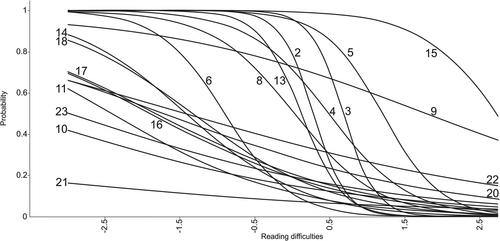The adult reading history questionnaire (ARHQ) is frequently used in research on adult dyslexia and family risk for dyslexia. However, this measure is lengthy (23 items), reducing its applicability in studies with extensive assessment batteries.
We identified the best-performing ARHQ items in a sample of 396 Finnish adults using exploratory factor analysis and item response theory. Consequently, we validated the brief questionnaire in independent Finnish and Dutch samples by comparing its performance with that of the complete questionnaire. We also evaluated how the scores on the questionnaires related to the scores on direct adult reading assessments in the Finnish samples. Finally, we tested how predictive parental questionnaires were of children's skills in the Dutch and one of the Finnish samples.
Five items were selected to construct the short version of ARHQ. All of them relate to childhood/adolescent reading difficulties rather than current adult skills. The scores of the complete ARHQ significantly correlated with those of the abbreviated version in all samples. Moreover, in one of the samples, direct reading assessment scores had a stronger correlation with the short ARHQ than with the full version. Additionally, across all three samples parental scores on the short ARHQ were at least as predictive of children's reading skills as the complete ARHQ.
The short ARHQ proved to be on a par with the complete version in its usefulness for identifying adults with dyslexia. Future research should investigate whether the five selected items can effectively serve as a brief screening measure for adults with dyslexia in languages other than Finnish and Dutch.



